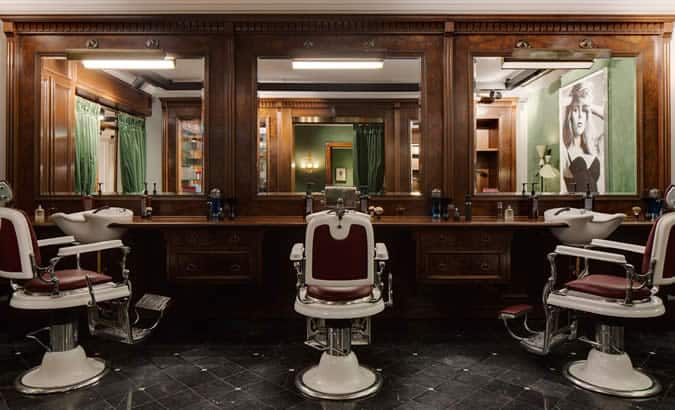Fast forward a few years, and the King of Kensington gets drafted. He goes to Wiesbaden in Germany, where the Americans have a base. Wiesbaden was left remarkably untouched during WWII, Reich Marshal Hermann Goering (who graduated law in Wiesbaden before the war) having made a deal with General Eisenhower during the war to preserve Wiesebaden, which was a Roman spa town used by the Nazis during the war and favored by the Americans afterwards. Goering's logic was simple. Why destroy the beautiful town? If Germany loses the war, the Americans would get it and be able to enjoy it the way the Nazis had. Goering's daughter Edda worked as a nurse in rehabilitation clinic in Wiesbaden after the war. I don't know if the King of Kensington ever met her, but you never know!


 The King of Kensington found himself at home in Wiesbaden, not because it was the army, but because the habits he formed back in the 'hood were still useful.
The King of Kensington found himself at home in Wiesbaden, not because it was the army, but because the habits he formed back in the 'hood were still useful.



















To be continued.



Si vis pacem, para bellum
Si vis pacem, para bellum. If you seek peace, prepare for war. Si Wiesbaden, para bellum. As the King of Kensington took Wiesbaden, there was much preparation. There were pound cake C-rations left over from 1943. There was the Voice of America. There was clearing the furniture out of the four storey walk up to make space for the Bohunk club, who met to discuss politics after a hard day's work. The military wives couldn't understand how their bohunks could leave the house without any money and come home drunk, but then that doesn't take into account the effectiveness of reacting. And when the King's first child came along, it made sense to call him Bo, after the Bohunk club.

BDO
In particular, the Economics 101 he learned at Kensington and Allegheny applied equally well to barracks life. A new friend--truth be told a Scottish gonif named BDO--arrived from his education as a sociologist or social worker (not exactly the same thing, but as close as gosh is to swearing) with a strong sense of injustice about the pay he was going to get as an assistant chaplain in the army compared to what he would have made as a lecturer in sociology or social workers back home. The difference--even if he didn't call it that--was the opportunity cost to himself of joining the army. You see, civilian pay beat what he got as a soldier.
To recoup his losses, BDO found ways to pay himself out of opportunities that presented themselves to him on the base at Wiesbaden. BDO was not a reactor in the formal sense, but he could keep up with the best of them. Unlike his Scottish cousins in the Old World, he was hardly canny and never cheap. But neither was he shrewd or in the least bit sensible. If you were to describe him, you might say he was practical, at times even pragmatic. But there's no point splitting hairs over BDO, whom we'll get back to momentarily.
Finer points of reactive dealing
For now, all that's important is to draw a distinction between a gonif, whom you might encounter in the Menswear of, say, an Army & Navy in Regina or Caplan's, or Ogilvy's, or Murphy-Gamble in Ottawa;





and a reactor, a familiar figure in any big North American city;

a brunnenvergifter, who quite literally "lifts gifts" (sometimes called an Indian giver, who gives you something with strings attached and expects a quid pro quo in return--a bit like Hannibal Lecter in Silence of the Lambs);


and the sort of businessman who used 3 scales, one for buying, one for selling, and one for himself, in case he lost track of what he had and what he bought in one of his many doubled ended transactions.


If you came from Kensington, you knew where you stood with all of them. There was no moral judgment against any of these characters. Everybody takes what they've got and makes something with it, and of themselves. After all, what's a poor girl to do in a world where you've got to pay to play. And BDO was definitely a player.


"George, I'm a reactor!"
A typical Kensington reactor was the barber, who ran his own kind of clip joint. He wasn't clipping coupons. But as far as that goes he did more than cut hair. When you went for a cut, more than your hair got clipped; you probably got one on the upside of the head, too. And if you ever showed up asking for your cut, you most likely left with a few touch ups from a styptic pencil, rather than a piece of the action. If the barber had been reincarnated, he might have clipped coins and sweated metal before that was outlawed across Europe with a variety of treason acts. As it was, all's he did was remind you from time to time of his peculiar avocation: "George, I'm a reactor!" If you got a shave, it had to be a close one. Reactors are into tight races, close finishes and narrow escapes. Whoever said there's no such thing as a sure thing in horse races?



Social credit
The only reasonable way I know to characterize BDO's double entry bookkeeping system on the base in Wiesbaden is to think of it as social credit.To be continued.

Comments
Post a Comment